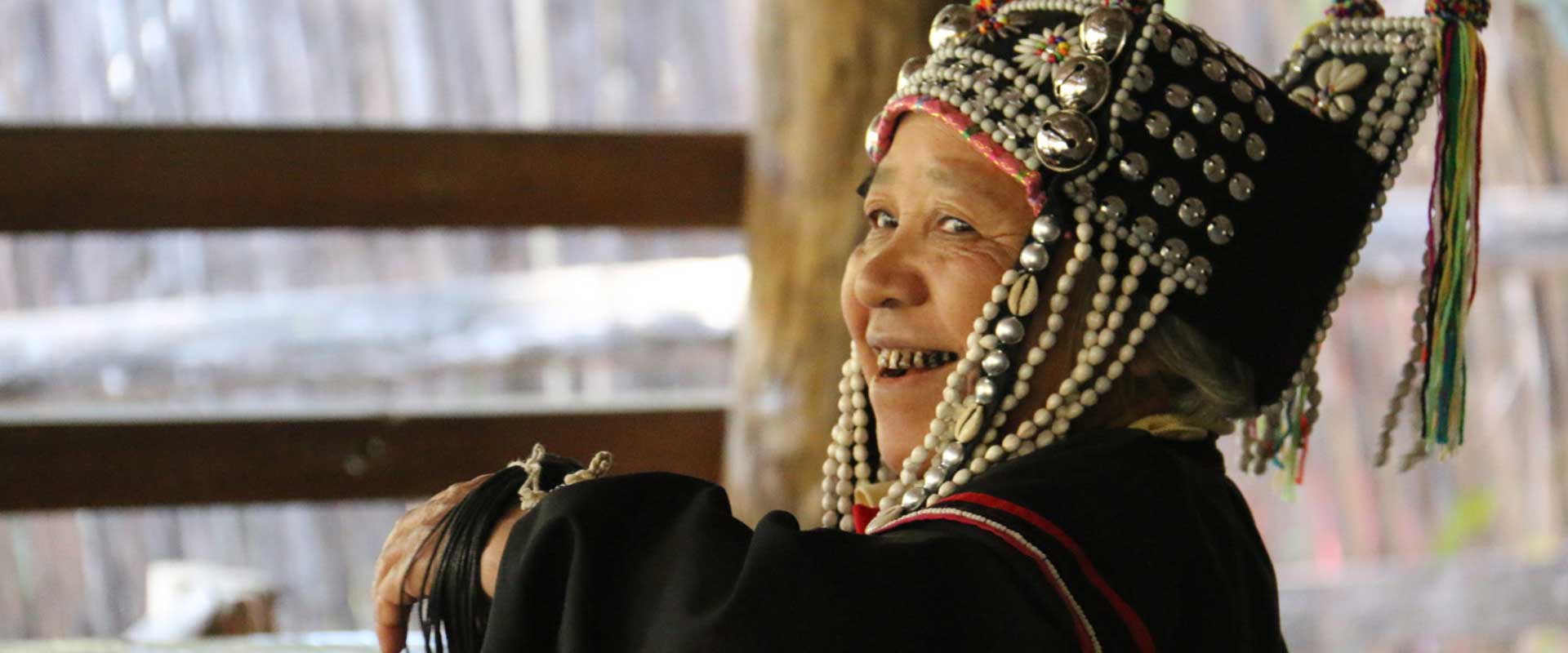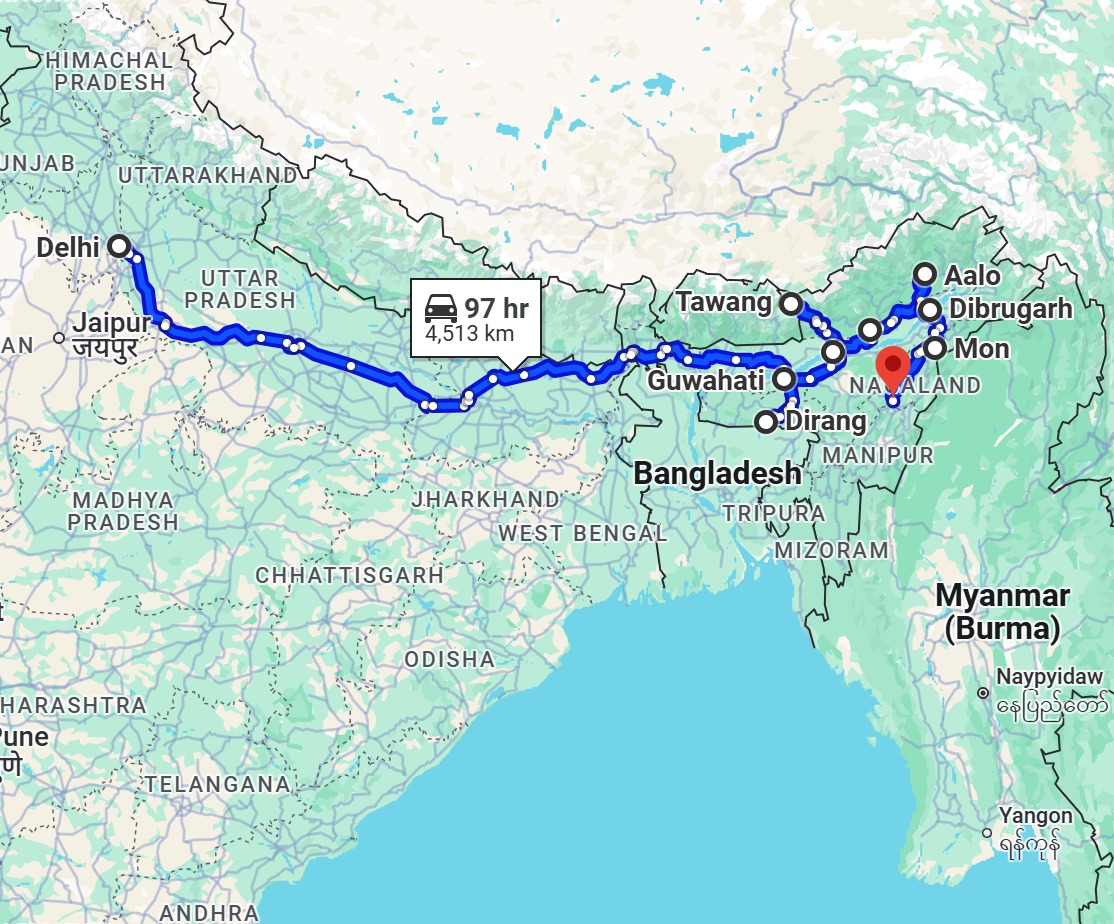- Home
- A&A Tours
- Trip Types
- Tailor Made
- Luxury Train Tour
- Destinations
- Luxury Hotels
- Luxury Cars
- About Us
- Find My Tour
To More Inquiry


The Konyak warrior tribe is one of the many Naga tribes. But what sets them different from the rest of the tribes of this northeastern Indian state is their brutal headhunting history, which was part of their powerful warrior heritage. Territorial conflicts between competing tribes and villages were resolved through fighting and Konyaks were feared for their headhunting prowess — they beheaded their foes and brought back the severed heads as trophies in a specially crafted basket that they carried to the battles. The heads were then proudly placed on the walls and entrances of the warriors. The Indian government issued a ban on headhunting in 1960 but Konyaks say that the ritual lasted for a few more years before limited components of modernity became accessible in these rural portions of Nagaland. The next generation of the Konyaks partially embraced a Baptist-based Christianity. In the isolated villages of Nagaland ‘s Mon region, which borders Myanmar, a motley band of old former warriors are still visible — their tattooed faces and torsos bear testament to lethal conflict and the once common headhunting. It was tradition to honor the guys with tattoos on their faces and chest as a mark of their heroic actions. The intricate process was done alone by the chieftain’s wife.
Get
to Guwahati and travel 180 km/5 hours by car to Tezpur (Assam). The city of
Sonitpur, as ancient Tezpur was known in the past, is rich in folklore and
mythology. The City of Blood reminds us of the bloody conflict between Hari and
Hara, as well as the romance story of Usha and Aniruddha. Hotel evening.
after
breakfast. Visit the orchid research centre in Tipi (Bhalukpong) en route.
Arunachal Pradesh is home to roughly 500 of India's thousands of orchid
species. In a tourist hostel in the evening.
After
breakfast, travel 140 km (14000 ft.) across Sela Pass to Tawang, which takes six
hours. On the way, visit the Monpa tribal communities and the 14,000-foot-high
Tsela Lake. The evening in the hotel or tourist lodge.
Tawang is the primary Mahayana Buddhist center and the home of the Monpa tribes. A full-day trip to the renowned Tawang Monastery follows breakfast. Known by its vernacular name, "Gompa," the 300-year-old monastery is thought to be the oldest in India and the second-largest in Asia, after Lhasa in Tibet. The Monastery is situated more than 12,000 feet above sea level on the spur of a hill. From above, the wide valley is surrounded by tall mountains on all sides. The Brandung Chung Ani Gompa, also known as the Monastery of the Nuns, is located twelve kilometers northwest of Tawang. Explore the 400-year-old Tawang Monastery, the Mahayana Buddhist study center, the Emporium, and the neighborhood marketplace. Evening in the tourist lodge or motel.
After
breakfast, travel 160 kilometers in 7 hours to reach Bomdila. At 8,000 feet,
Bomdila, the capital of Arunachal Pradesh's West Kameng district, is home to a
mixed tribal population of Monpa, Sherdulpen, Aka, Miji, Bhugun, and Tibetans.
It also boasts a stunning view of the snow-capped mountains on the way. While
traveling, stop by the Jung Waterfall and Jaswantgarh, a 1962 Indo-China War
memorial built in honor of Jaswant, a valiant Indian soldier who fought by
himself and managed to hold off the Chinese forces for 72 hours during the
conflict. Evening at a hotel or resort. See the local maEmporiumseum, Emporium,
and the high and lower gompas (Buddhist monasteries) at Bomdila.
The modern city of Itanagar, the capital of Arunachal Pradesh, was built close to the remains of the fort that served as the state's capital in the fourteenth century. Spending some time at the outstanding Jawaharlal Nehru Museum in Itanagar will undoubtedly introduce you to the local culture and heritage. Here are all the models for the bamboo and cane architecture of many tribes' homes, clothing, practical tools, and other handicrafts. Hotel evening.
After
breakfast, visit the local market and museum before making the 150-kilometer,
6-hour drive to Ziro. Traveling through Nishi tribal settlements. (Long home)
Hotel evening.
is
spent at Ziro, the capital of the Lower Sabunsiri district of Arunachal
Pradesh. Situated at an elevation of 1560 meters, the plateau is encircled by
the Apatani tribal communities of Dibbo, Hija, Bulla, Hari, and Hong. The
second-most important and well-organized tribal village in Asia is Hong
Village. Women's nose plugs and men's tattoos are what make the Apatani tribe
unique. Hotel evening.
Daporijo, the 600-meter-high capital of Arunachal Pradesh's Upper Subansri district, is home to Tagin tribespeople. You may stop in Hillmiri ethnic communities along the way. Tented/paying guest/evening in the Circuit House.
The
Adi (Gallong) tribes' headquarters are situated at a height of 300 meters in
the west Saing district of Arunachal Pradesh. Adi subtribes that are different
from one another include the Enroute Tagin tribal settlements and the Adi
(Gallong, Minyong, Pasi, Padam, Bori, and Boker). Hotel evening.
Full day of activities at Along. See the Adi Gallong tribal communities in Jirdin, Kabu, Kaying, and the Cane Bridge on the Siang River. The Adis are skilled at building cane bridges, which are 60 to 70 meters long and made of bamboo to link to the other hill tribes. Hotel evening.
Visit the East Siang District's district headquarters in Pasighat following breakfast. Visit the Adi (Minyong) tribal communities en route. The evening at the Government Guest House/hotel.
After
breakfast, proceed to the ferry ghat to board a boat to Dibrugarh and cross the
Brahmaputra River by a country-built ferry, which takes five to six hours to
get to Dibrugarh. The Siang and Lohit rivers in Arunachal Pradesh meet to form
the Brahmaputra. For these tribes, the ferry service from Pasighat to Dibrugarh
is essential. Hotel evening.
after
breakfast, travel 200 kilometers (7 hours) to Mon District headquarters, which
is located at an elevation of 897.64 meters above sea level. The Konyaks tribes
call it home. It's interesting to see the tattooed faces here dressed
traditionally and with feathered headdresses. The Konyaks are skilled and
accomplished artisans. Wonderful wood carvings, daos (machetes), weapons,
gunpowder, headdresses, and other items can be found here. Tourists lodge in
the evening.
Go
to Shangnyu, a typical Konyak tribal hamlet. One of the most well-known
villages in the Mon District, it is ruled by the chief Angh. There is a
beautiful eight-foot wooden memorial. It is in height and 12 feet in width, and
it is thought to have been built by angels from heaven. This monument is
adorned with carvings that depict humans and other animals. Visit Konyak
Murungs as well, where the collection of human skulls is still on display. In
the past, Konyaks were headhunters who would save their enemies' heads as
trophies.
Drive
to Mokokchung, the district headquarters, which is located 1325 meters above
sea level, after breakfast. The AO Nagas' cultural center is located in this
charming community. To demonstrate their superiority over their opponents, the
AO warriors would don the exquisite handwoven shawl in shades of black and scarlet,
adorned with a white belt. Moatsu in early May and Tsungremmong in August are
the two main AO festivities. Circuit House in the evening.
After
breakfast, travel for seven hours to Kohima, the state capital and hill
station, which is located 180 km above sea level at an elevation of 1444
meters—hotel evening.
Visit the Angami tribal settlement of Khonoma after breakfast. The community, which is 20 kilometers west of Kohima, has its traditions of bravery and strength. According to history, in the good old days, Khonoma provided protection to several settlements. The story of the British invasion of Naga is told through the village gate. Hills. War Cemetery: An evocative monument built to remember the men and commanders who gave their lives in the Second World War. Museum: The state museum has an extensive collection of artifacts from several tribes that discuss the history and customs of the Nagas. Visited the local market as well.
After
breakfast, drive 75 km (2 hours) to the airport in Dimapur or continue on to
Kaziranga National Park and then Guwahati. Drop Guwahati Airport for Your
Flight to Delhi and Your Next Destination.


Immerse yourself in the grandeur of luxury at our exquisite palaces, hotels, resorts and safaris.
1 night, 2 adults
$ 9501 night, 2 adults
$ 8001 night, 2 adults
$ 9001 night, 2 adults
$ 8001 night, 2 adults
$ 7501 night, 2 adults
$ 600